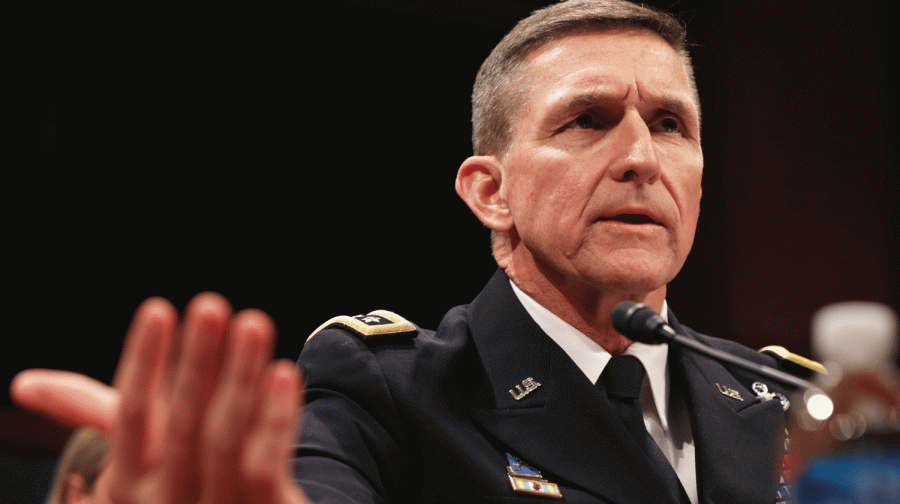Former National Security Advisor Michael T. Flynn Resigns
Professor Rostow considers the implications of Flynn’s alleged collusion with Russia. Flynn pictured above.
On Monday, February 13, retired three-star Lieutenant General and former Director of the Defense Intelligence Agency Michael T. Flynn resigned from his post as National Security Adviser for President Trump’s administration after 24 days in office. Flynn’s resignation came after information about his phone calls with Russian ambassador Sergey I. Kislyak was reported to the White House by the Justice Department, who had listened to the conversation through a government wiretap.
The phone call in question took place before President Trump and Flynn took office in January. Flynn and Kislyak discussed sanctions on Russia related to the alleged interference in the United States presidential election over the phone.
Charles Evans Hughes Visiting Chair of Government and Jurisprudence Nicholas Rostow currently teaches in the Political Science Department at Colgate. Professor Rostow has previously served as the Legal Adviser to the National Security Council, and as Special Assistant to presidents Ronald Reagan and George H. W. Bush for National Security Affairs, among other distinguished positions. He commented on the actions taken by Flynn.
“It’s obvious that he lost the confidence of the President. The national security adviser’s job is to run a decision-making process for the President,” Rostow said.
In Flynn’s resignation letter, he admitted to “inadvertently” briefing the Vice President with “incomplete information” due to the “fast pace of events,” and has since “sincerely apologized.” Originally, Flynn had claimed that the content of the conversations were inconsequential. Not soon after, however, Flynn admitted that he might have discussed sanctions on Russia with Ambassador Kislyak.
Rostow noted the circumstances that may have led to this controversy.
“It’s hard to say if Flynn was undercut – it’s characteristic of presidencies to attract very ambitious individuals. Flynn very well could have been overwhelmed,” Rostow said.
Michael Flynn had no prior White House experience.
In Flynn’s absence, President Trump appointed retired army Lieutenant General Keith Kellogg as acting National Security Adviser, who was replaced on Monday by now National Security Adviser Lieutenant General Herbert Raymond “H.R.” McMaster.
Colgate students and faculty responded to Flynn’s resignation by offering their opinions on his actions as well as their views on the American political system. First-year Ryan Zoellner emphasized the questionable nature of Flynn’s political actions.
“Having a cabinet member resign is neither unprecedented nor uncommon. That being said, Flynn deliberately misled members of the administration, and his Russian ties were, at the very least, suspect; it was proper that he resign. Still I think much of the coverage of the situation was overblown,” Zoellner said.
At the moment, Rostow believes the Trump administration can run more smoothly in time.
“Trump has virtually nobody in his administration. In six to nine months presumably there will be appointments and the administration will run better,” Rostow said.
Senior Kerinne O’Connor discussed the implications that Trump’s own connections and his cabinet members’ connections to Russia bring for the
American people.
“Flynn’s ties to Russia and the conflicting messages from both the president and the press have highlighted the dysfunction of Trump’s White House. It’s scary to think that some people trying to run our country are leaving us so vulnerable,” O’Connor said.
Although respecting Flynn’s decision to resign, senior Francesca Viola feels that other important political issues are in need of discussion.
“I’m a little surprised that this issue has been getting as much attention. Yes, Flynn conducted U.S. diplomacy before assuming the position of national security advisor and knowingly held back this information from Vice President Pence so he should resign. However, this issue pales in comparison to the actions of some other politicians whose carelessness has cost some Americans their lives. This issue most likely didn’t compromise national security or cost anyone their life so I don’t feel obligated to analyze this story much more,” Viola said.
Professor of Political Science Stanley Brubaker commented on Flynn’s resignation and the mistakes made while in office.
“Flynn’s great offense, I think, was misleading (aka, ‘lying to’) Vice President Pence. Actually, it’s not terribly surprising that an ex-high U.S. government official and likely nominee should talk to high level Russians (assuming no deals were made or discussed); but exactly because that’s not such a biggie, that Flynn should try to cover it up makes me suspicious,” Brubaker said. “Also, that President Trump kept VP Pence loop-less (out of the loop) and thus caused him to go out on a limb on behalf of Flynn on talk shows without
immediate correction … is egregious.”







